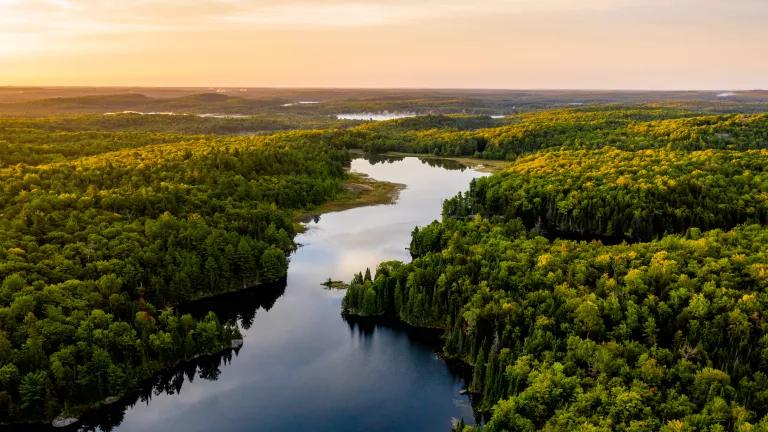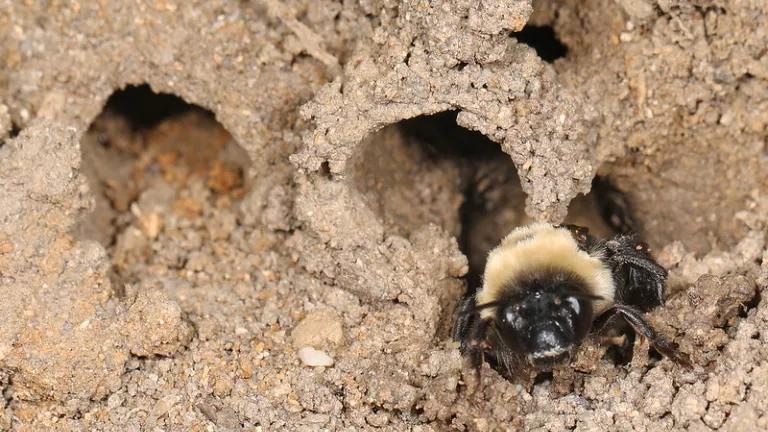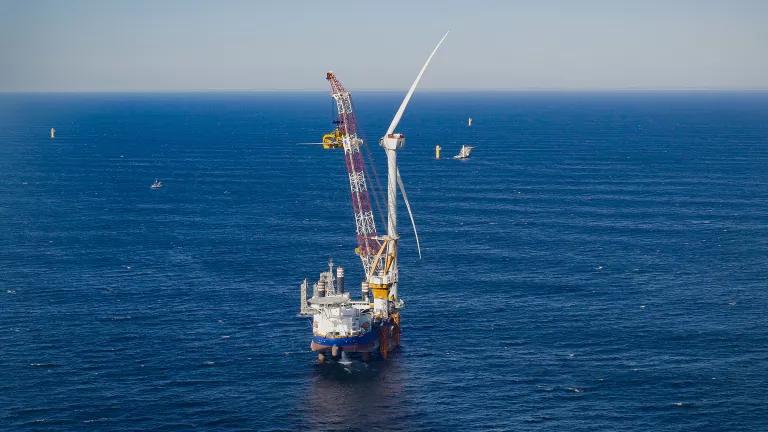Leaders Call for Forest Accountability in Climate Week Event
Leading voices call for global accountability on protecting the world's climate-critical forests in NRDC's Climate Week panel event.

Boreal forest in Canada
Nearly two years ago, more than 140 countries signed a groundbreaking agreement, the Glasgow Leaders’ Declaration on Forests and Land Use, committing to halt and reverse deforestation and land degradation by 2030 as a critical pillar of addressing climate change. However, even as the urgency of forest protection has grown more palpable, with rising temperatures and a cascade of extreme weather, the signatories have kept the Glasgow Declaration largely trapped in the theoretical, untethered from meaningful implementation or accountability.
NRDC’s Climate Week panel, Toward a Glasgow Declaration Accountability Framework: Delivering Truly International Forest Protection, From the Tropics to the Global North, moderated by NRDC President Manish Bapna, brought together Indigenous and community leaders, government officials, and policy experts to discuss the necessity of building accountability mechanisms that can address a long-broken forest policy paradigm that has obscured and enabled the loss of climate-critical forests outside the tropics.
At the start of the panel, Dr. Bill Moomaw, one of the world’s most renowned forest scientists and policy experts, described how, from its signing, the Glasgow Declaration was burdened by longstanding loopholes enabling northern countries to offload responsibility for their own forest impacts.
Forest policy is entrenched in an insidious, geopolitically determined duality between Global North and Global South. Tropical deforestation is a matter of global concern while industrial logging has quietly eroded some of the world’s last primary and old-growth forests, all under the banner of “sustainable forest management.” Countries like Canada can claim near-zero deforestation, while clearcutting more than 1.3 million acres each year, much of this in irreplaceable primary and old-growth forests. In fact, northern industrial logging is the single largest driver of gross tree cover loss in the world, with climate consequences that rival those of tropical deforestation. “This isn’t just the Amazon,” Dr. Moomaw cautioned. “It’s us.”
This erasure has driven the rapacious destruction of forests in communities in the Southeastern United States, like Rev. Leo Woodberry’s. The Southeast, Rev. Woodberry highlighted, is being logged at twice the rate of the Amazon, in large part to feed heavily subsidized demand for biomass energy (the burning of wood pellets) in the UK and Europe. Not only, as Siim Kuresoo with the NGO Fern explained, is the burning of forest biomass devastating for the climate, with an emissions footprint that exceeds that of coal per unit of energy, but it has burdened already vulnerable communities in places like South Carolina with the loss of their local ecosystems, health impacts, flooding, extreme heat and topsoil erosion.
Northern logging also often occurs in violations of the rights of Indigenous Peoples, many of whom, like the Cree in Northern Quebec, depend on the land for their way of life. Deputy Grand Chief of the Cree Nation Norman Wapachee described the critical importance of the land to the Cree and how “what you do to the land, you do to the people.” “Forestry,” he recounted, “has been a big impact for decades within our territory.”
“What you do to the land, you do to the people.”
Norman Wapachee, Deputy Grand Chief of the Cree Nation
Over the months prior to the panel, NRDC has urged governments to establish a Glasgow Declaration Accountability Framework (GDAF) to address these dynamics. The GDAF would develop national reporting requirements, monitoring investments, and common understandings to better position the Glasgow signatories–particularly those from the Global North–to deliver on their pledge. It would also include concrete, foundational policy commitments that would drive investments in more just, sustainable economies.
Now, the GDAF has the support of African nations. For too long, Sikeade Egbuwalo from Nigeria’s Ministry of Environment explained, the international community has been asking the Global South “to do more with less while the wealthy countries of the Global North continue to do less with more.” As a result, Ms. Egbuwalo announced, African countries “have reached a consensus to support the development of a Glasgow Declaration Accountability Framework as a means of driving global progress and promoting greater equity between forest protection standards.” Their vision, she added, is for the accountability framework “to ensure that the World truly unites and responds as one.”
The GDAF would complement other leading efforts from governments and organizations such as the European Union, which recently passed the EU Deforestation Regulation (EUDR). The EUDR, Manuel Carmona Yebra, Counsellor for Environment and Oceans at the Delegation of the EU to the United States, described, promotes accountable supply chains in both tropical and northern forests. In fact, it marks the first time that a global trade regulation unequivocally applies to certain types of industrial logging in the Global North.
African nations have reached a consensus to support the development of a Glasgow Declaration accountability framework as a means of driving global progress and promoting greater equity between forest protection standards. The vision of Nigeria and the rest of Africa through the development of this accountability framework is to ensure that the World truly unites and responds as one.
Sikeade Egbuwalo, Ministry of Environment of Nigeria
Accountability also means elevating community voices and Indigenous knowledge and leadership. As Rev. Woodberry urged, “We need to ensure that communities that are impacted are involved with decision making.” The Cree Nation, Deputy Grand Chief Wapachee highlighted, has fought for years to have a say in decision making in their homeland of Eeyou Istchee and made extraordinary strides in the establishment of a Cree-led protected area. In any forest policy framework, Indigenous governance and stewardship and the integration of traditional knowledge is vital for effective, equitable solutions.
In December, world leaders will gather in Dubai for an annual climate conference, where countries will take stock of progress and shortfalls. As the panelists made clear, forest accountability needs to be integral to those discussions. Too often across the history of forest policy, agreements have been something to be signed, worn as a badge for a period of years, missed, and forgotten. Time is now running short for the world’s climate-critical forests. Without accountability, it will soon run out, all under a façade of progress and sustainability.




